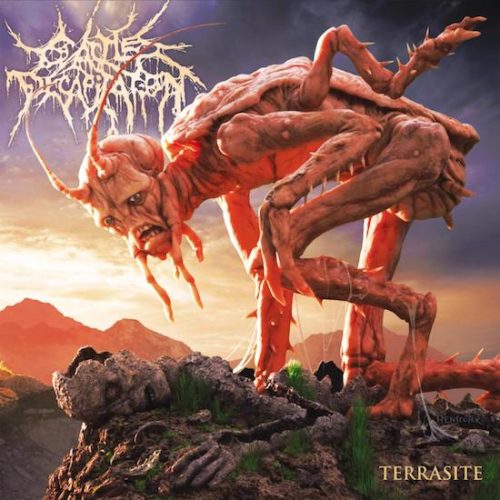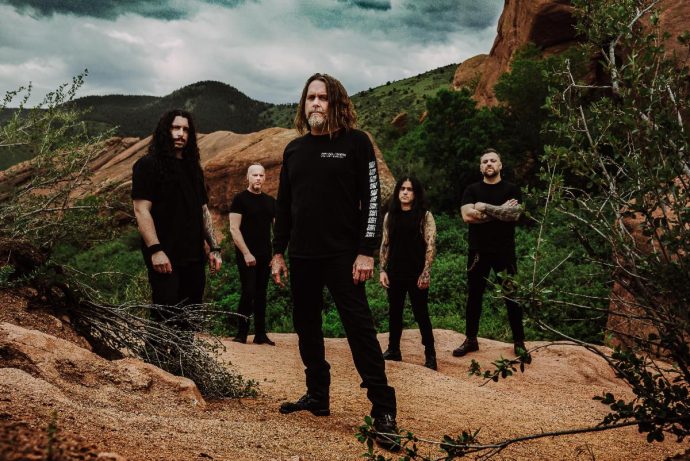
(Cattle Decapitation are about to serve up another platter of pain and Andy Synn is here with a gourmand’s take on what to expect)
Now, before we begin, I’m going to say something controversial.
You’re not going to want to hear it, but I think it’s important in order to establish a basis of trust and, hopefully, understanding between us.
Are you ready? Ok… Death Atlas was not as good as you think it was.
Don’t get me wrong, it was a good album overall, and I understand why it was the band’s big “breakthrough” (sure, their star had been on the rise ever since The Harvest Floor, if not before), but in hindsight it’s obvious – to me at least – that the band themselves weren’t quite sure what to do with their newfound fame, which led to at least a handful of tracks feeling as though they were being written more to fit someone else’s formula of what the band “should” be doing now that they were on the road to success.
But we’re not here to talk about their last record, we’re here to learn all about their new one, and the only real reason I mention it is because Terrasite is the album which Death Atlas was trying to be… without even trying.

There’s no doubt in my mind that the Cattle Decapitation who wrote and recorded Terrasite are far more comfortable with who they are, and their newfound position right near the top of the Death Metal food-chain, than they were just a few years ago.
But “comfortable” doesn’t mean “complacent” and, if anything, the band’s increased confidence in their mastery of their craft means that, as this album demonstrates, they’re less interested in trying to impress the people around them and more focussed on seeing what they can do, and how far they can take their signature sound, now that all the shackles are off.
It’s not just the increased confidence in their own ability to go toe-to-toe with some of the scene’s biggest and best which helps this record to shine though, it’s the fact that it just feels far more balanced than its predecessor – it’s not about just ticking boxes and showing off its tricks, it’s about using the band’s natural talents in ways which fit each situation, with just as much emphasis placed on twitchy, techy riffs (“Scourge of the Offspring”, “Solastalgia”) and hammering, high-impact grooves (“We Eat Our Young”) as on mutant melodies and weirdly-catchy choruses.
This greater sense of balance even extends to the vocals, as while some listeners and long-time fans have previously expressed some (not unjustified) concerns about the ever-increasing use of Travis Ryan’s unorthodox singing voice turning into more and more of a gimmick (while still acknowledging that he’s one of the most visceral and versatile vocalists in the entire extreme scene) that’s much, much less of a concern here.
That’s not to say that his inimitable, instantly-recognisable singing style doesn’t have its place – tracks like “Terrasitic Adaptation” and mid-album highlight “…And The World Will Go On Without You” employ his creepy crooning in just the right amounts to make these injections of eerie beauty feel actually earned – but the songs don’t rely on them to do all the heavy lifting and, if anything, it’s actually many of his more restrained melodic moments (such as the moody “We have always been the virus” refrain in “The Insignificants”) which have the biggest overall impact.
Sure, if I had to find something to criticise I might say that sometimes – and only sometimes – it feels like Terrasite might just be a little too overstuffed for its own good… but, then, I really don’t know what or where you’d cut (maybe “Dead End Residents”?), as there’s no single part of this succulent ten-course meal that really qualifies as “fat” or “filler”.
With a little luck (and the right sort of push) there’s a good chance that Terrasite will end up being Cattle Decapitation‘s own version of The Satanist (a comparison which will make even more sense, I promise, when you finally get to experience the gloomy grandeur of ambitious closer “Just Another Body”) – the album that will once and for all put them on the map as one of modern Metal’s “big names”.
And while that may mean losing some long-term fans who can’t accept that the group are never going back to who, and what they used to be, that’s ok. After all… the band will go on without them.

This is going to sound pretentious – probably because it is pretentious – but if I had to describe Death Atlas with a genre label, it would be blackened epic melodeathgrind (with a capital ‘B’ and a lowercase ‘g’). The album stripped back a lot of things compared to the previous few albums in order to create a blackened cinematic atmosphere that I felt was very deliberate – a very intentional feel to the album to match the themes. I actually thought they succeeded in what I believe they might have been trying to do with that album. It felt coherent.
But just as there’s a difference between melodic death metal and melodeath, I feel that the band is most ‘true’ to their uniqueness when they are playing melodic deathgrind, not melodeathgrind.
Scourge of the Offspring for example makes my skin crawl with anxiety, almost panic, given how we are accelerating towards an ecosphere and planet that will be uninhabitable for so much of humanity and for millions of species. Death Atlas left me with a ‘sad beauty’, almost a ‘happy sad’ feeling, or maybe a resigned sad feeling. Scourge of the Offspring is far more disturbing.
I agree with what you’re saying here completely. I feel that while the general theme of the two albums is basically the same regarding the state of our world, the intention of Death Atlas was to sadden, while Terrasite intends to terrify.